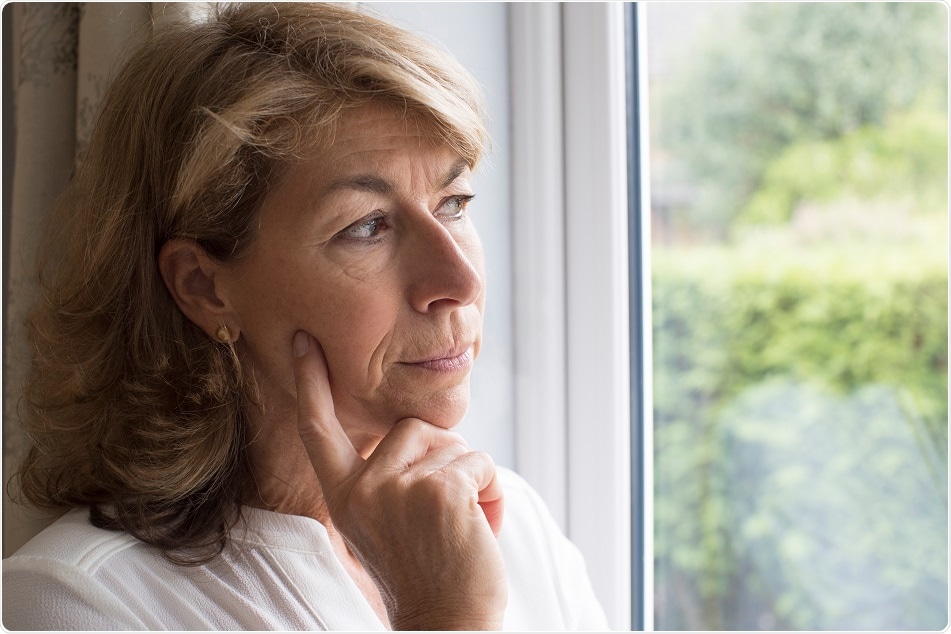Agoraphobia is based on the presence of fear of situations which are grouped into five categories. These categories are:
- public transportation
- open spaces
- enclosed public spaces
- crowds or standing in line
- being outside of the home in general
The fear or anxiety must occur in two of the five situations to meet criteria for agoraphobia. According to the DSM-V, if the individual fears only one situation, the specific phobia is the diagnosis. Agoraphobia also differs from a specific phobia in terms of feared consequences. If the situation is feared for anxiety or panic responses alone, it falls into the category of agoraphobia. If the situation is feared for other reasons, then it is more likely a specific phobia.
 Credit: Daisy Daisy/ Shutterstock.com
Credit: Daisy Daisy/ Shutterstock.com
Symptoms
Physical symptoms of agoraphobia resemble those of an anxiety or panic attack. Those could include:
-
Shortness of breath
-
Chest pain
-
Trembling or shaking
-
Lightheadedness
-
Sweating
-
Nausea
Cognitive symptoms of agoraphobia relate to thoughts about the situation or symptoms. Some of those thoughts might be:
-
Fear of embarrassment in front of others
-
Fear of dying or suffocating
-
Being unable to escape in the event of a panic attack
-
Fear of Insanity
-
Fear of losing control
-
Fear of attracting attention
-
Worry about being unable to function or survive alone
-
General anxiety or dread
Agoraphobia leads to certain characteristic behavior patterns. Some behaviors associated with agoraphobia are:
- Avoidance of triggering situations such as crowded places and public transit
- Not being able to leave the house
- Needing a trusted companion when one goes out
- Avoidance of travel
How Does Agoraphobia Work?
Causes
Biological, psychological and environmental factors are believed to contribute to agoraphobia. Studies have shown some familial clustering of agoraphobia. The heritability of agoraphobia is estimated at between 48 and 61 percent, meaning the genetic contribution is moderate with contributions from environmental factors having a greater impact.
Personality factors influencing agoraphobia include introversion/extroversion, anxiety sensitivity, and dependency. Extroversion has been negatively associated with agoraphobia, but not panic disorder. Anxiety sensitivity, or a belief that symptoms of anxiety are dangerous, predicts panic disorder and agoraphobia without panic attacks.Dependent and avoidant personality traits can predict the onset of agoraphobia.
One common theory about how agoraphobia develops is catastrophic interpretations. It states that healthy individuals interpret certain physical sensations as normal or not alarming. Those same sensations are interpreted as imminently dangerous by an individual with panic disorder. For example, a racing heart after climbing stairs might be interpreted as a sign of an oncoming heart attack. This theory suggests that such patients can find significant relief by changing the way they interpret bodily sensations.
Treatment
Cognitive behavioral therapy (CBT) is the most commonly used form of therapy for agoraphobia. The goal of CBT is to learn skills to help tolerate anxiety, change distorted thought patterns, and return to normal activities.
For patients who have trouble leaving home, alternatives to office appointments are possible. Some options are meeting in the home, having sessions over the phone, or using a computer. In more severe cases, hospital inpatient treatment may be necessary.
Exposure therapy is another commonly used treatment method, as well as applied relaxation, where the patient works on regaining the ability to relax.Agoraphobia can be treated with antidepressants and anti-anxiety medications. Selective serotonin reuptake inhibitors (SSRIs) are often prescribed for panic disorder with agoraphobia.
Sources
- NHS, Agoraphobia, https://www.nhs.uk/Conditions/Agoraphobia/Pages/Introduction.aspx
- Panic disorder and agoraphobia: an overview and commentary on DSM-5 changes, http://onlinelibrary.wiley.com/doi/10.1002/da.22277/full
- NHS Choices, Symptoms of Agoraphobia, https://www.nhs.uk/Conditions/Agoraphobia/Pages/Symptoms.aspx
- Differential familial liability of panic disorder and agoraphobia, https://www.ncbi.nlm.nih.gov/pubmed/18023003
- UpToDate, Agoraphobia in adults: Epidemiology, clinical manifestations and diagnosis, cursoenarm.net/UPTODATE/contents/mobipreview.htm?3/49/3856/abstract/8
- NHS Choices, Treating agoraphobia, https://www.nhs.uk/Conditions/Agoraphobia/Pages/Treatment.aspx
Further Reading
Last Updated: May 15, 2019